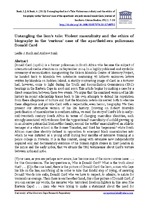| dc.contributor.author | Bank, Leslie J. | |
| dc.contributor.author | Bank, Andrew | |
| dc.date.accessioned | 2017-06-12T10:21:50Z | |
| dc.date.available | 2017-06-12T10:21:50Z | |
| dc.date.issued | 2013 | |
| dc.identifier.citation | Bank, L. J. & Bank, A. (2013). Untangling the Lion's Tale: Violent masculinity and the ethics of biography in the 'Curious' case of the apartheid-era policeman Donald Card. Journal of Southern African Studies, 39 (1): 7-30 | en_US |
| dc.identifier.issn | 0305-7070 | |
| dc.identifier.uri | http://hdl.handle.net/10566/2965 | |
| dc.identifier.uri | http://dx.doi.org/10.1080/03057070.2013.768792 | |
| dc.description.abstract | Donald Card (1928–) is a former policeman in South Africa who became the subject of
international media attention on 21 September 2004. In a highly publicised and symbolic
ceremony of reconciliation inaugurating the Nelson Mandela Centre of Memory Project, he
handed back to Mandela two notebooks containing 78 hitherto unknown letters written by
Mandela on Robben Island. A starkly contrasting image of Card as a torturer had, however,
come to light during the Truth and Reconciliation Commission (TRC) hearings in the Eastern
Cape in 1996 and 1997. This article begins by making a case for a direct connection between
these two events. We argue that the sanitised version of his life history in recent
scholarship traces back to his own attempts to defend his reputation from these allegations of
torture and that the Mandela notebooks served both to obscure these allegations and provide
Card with a respectable, even heroic, biography. We then present our alternative version of
his life history. Drawing on Robert Morrell’s periodisation of masculinities in southern
Africa, we read the story of Card’s life in early–mid-twentieth century South Africa in terms
of changing masculine identities, each strongly associated with violence: first the
‘oppositional’ masculinity of a child growing up in an abusive patriarchal Irish settler
family, second the ‘settler’ masculinity of an athletic teenager at a white school in the former
Transkei, and third his ‘hegemonic’ white South African masculine identity defined in
opposition to emergent black masculinities into which he was initiated as a young adult
during four months of intensive training at a police college in Pretoria. It is in this context,
along with extensive new independently acquired oral and documentary evidence of his
human rights abuses in East London in the 1950s and the early 1960s, that we situate the TRC
testimonies about Card’s torture between 1962 and 1964. | en_US |
| dc.language.iso | en | en_US |
| dc.publisher | Routledge Taylor Francis Group | en_US |
| dc.rights | Publisher retains copyright. Authors may archive the published version in their Institutional Repository. | |
| dc.source.uri | http://dx.doi.org/10.1080/03057070.2013.768792 | |
| dc.subject | Untangling the Lion’s Tale | en_US |
| dc.subject | Violent masculinity | en_US |
| dc.subject | Apartheid-Era | en_US |
| dc.subject | Donald Card | en_US |
| dc.subject | Mandela notebooks | en_US |
| dc.subject | South Africa | en_US |
| dc.title | Untangling the Lion's Tale: Violent masculinity and the ethics of biography in the 'Curious' case of the apartheid-era policeman Donald Card | en_US |
| dc.type | Article | en_US |
| dc.description.accreditation | Department of HE and Training approved list | |

